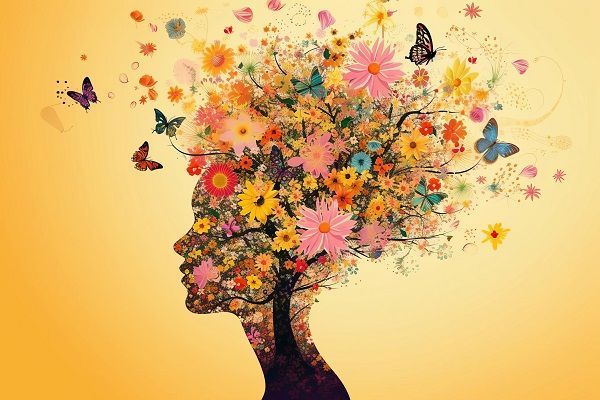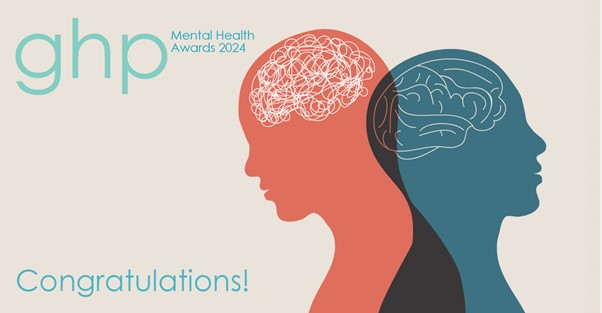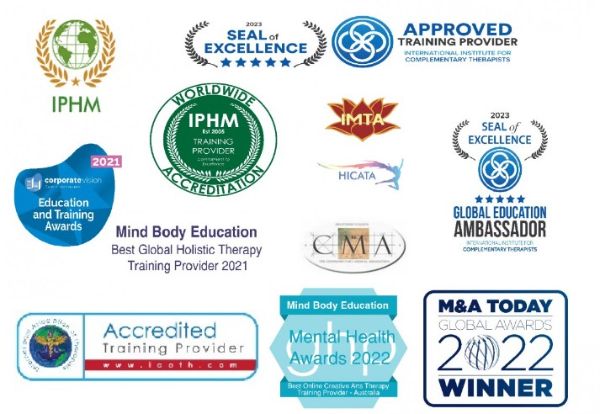Mind Body Education
Award-Winning Training For Holistic Therapists

Master Practitioner of Holistic
Counselling On-campus Program
Next Intake:
Commences on Fridays July 2025
Limited places are available.
Six school terms (10 weeks each)
Class from 9 am to 2.30 pm
Class from 9 am to 2.30 pm
No classes during the QLD School holidays
Approximately 6 hours of homework per week.
Industry Approved Training.
Enrollments for the January 31st intake are now closed.
Course Fees
All course fees are shown in Australian dollars.
Full Fee Paid on Enrolment:
$6,600 (includes GST)
Payment Plan:
Payment of $550 on enrolment
Plus, 52 payments of $130.00 - due weekly
Total course fee = $7,310 (includes GST)
Full Fee Paid on Enrolment:
$6,600 (includes GST)
Payment Plan:
Payment of $550 on enrolment
Plus, 52 payments of $130.00 - due weekly
Total course fee = $7,310 (includes GST)
Plus materials fee - $200 (once only)
This fee covers all required art supplies and printed lectures for the entire course. You will be invoiced for this amount one week before your course commences.
This fee covers all required art supplies and printed lectures for the entire course. You will be invoiced for this amount one week before your course commences.
Financial Aid Study Grant
In response to the current financial climate, Mind Body Education has developed the Financial Aid Study Grant program to support individuals facing financial challenges who aspire to train for a new, fulfilling career as industry-accredited holistic therapists.
This program provides financial assistance to significantly reduce course fees for those who could not otherwise afford to enrol.
Paid in Full Financial Aid Study Grant = $4,400 (includes GST)
Payment Plan Financial Aid Study Grant =
Payment of $550 on enrolment
Plus, 70 payments of $65 - due weekly
Total course fee = $5,100 (includes GST)
The payment plan commences on the course start date.
You will be sent payment plan details.
This program provides financial assistance to significantly reduce course fees for those who could not otherwise afford to enrol.
Paid in Full Financial Aid Study Grant = $4,400 (includes GST)
Payment Plan Financial Aid Study Grant =
Payment of $550 on enrolment
Plus, 70 payments of $65 - due weekly
Total course fee = $5,100 (includes GST)
The payment plan commences on the course start date.
You will be sent payment plan details.
Our Master Practitioner of Holistic Counselling Program is unlike any other. It offers a comprehensive, multi-disciplinary approach that blends advanced holistic counselling skills with creative arts therapies.
This course is designed to equip you with a broad and versatile toolbox, allowing you to support your clients with techniques such as art therapy, drama therapy, sound therapy, movement and dance therapy, positive psychology techniques and more.
This course provides exceptional holistic counselling training, and also prepares you to start generating income within just 10 weeks of your training program as an industry-recognized meditation teacher with counselling skills for meditation teachers.
This course provides exceptional holistic counselling training, and also prepares you to start generating income within just 10 weeks of your training program as an industry-recognized meditation teacher with counselling skills for meditation teachers.
Whether you're starting a new career or expanding your current practice, this course provides everything you need to make a meaningful impact while building a thriving holistic wellbeing business.

Graduates of this program receive:
Five internationally recognized industry-accredited qualifications:
IICT Recognised certification:
(1) Meditation Teacher
(2) Holistic Counselling Skills for Meditation Teachers
(3) Meditation Therapist
(4) Master Practitioner of Holistic Empowerment Coaching
(5) Master Practitioner of Holistic Counselling
Initials graduates can use: Mbe.HolCouns. (Mind Body Education Master Holistic Counselling)
You will also receive 17 Proficiency Certificates for each of the independent courses that combine to make up this program. (See courses below).
IICT Recognised certification:
(1) Meditation Teacher
(2) Holistic Counselling Skills for Meditation Teachers
(3) Meditation Therapist
(4) Master Practitioner of Holistic Empowerment Coaching
(5) Master Practitioner of Holistic Counselling
Initials graduates can use: Mbe.HolCouns. (Mind Body Education Master Holistic Counselling)
Plus 10 Certificate of Competency
In the following creative arts therapies for holistic counsellors- Art Therapy: Learn how visual art can serve as a healing tool for emotional expression and processing.
- Sculpture: Use three-dimensional art to help clients explore their inner world through tactile, physical creations.
- Sound Therapy: Incorporate sound and music to help regulate emotions, reduce stress, and facilitate deep relaxation.
- Sand Therapy: Utilize sand and miniature figures to help clients explore their subconscious in a safe and symbolic way.
- Drumming Therapy: Engage clients in rhythm and movement to access deep emotional release and expression.
- Drama Therapy: Use role-playing and storytelling to help clients explore their emotions, behaviours, and life experiences.
- Music in Therapy: Understand how to incorporate music into the therapeutic process to connect with clients on an emotional level.
- Movement and Dance Therapy: Encourage clients to use their body in motion to express and release emotions, fostering both emotional and physical well-being.
- Play Therapy: Use play as a medium to explore complex emotions in a way that feels safe and accessible for clients.
- Storytelling and Role Play: Help clients reshape their personal narratives and express their inner experiences through role-playing and storytelling techniques
You will also receive 17 Proficiency Certificates for each of the independent courses that combine to make up this program. (See courses below).
On successful completion, you will be able to apply for insurance and join relevant industry associations as a Meditation Teacher, Empowerment Coach, and Holistic Counselor.
You will be able to practice legally throughout Australia in a variety of settings, including private practice.
What is Holistic Counselling?
Holistic counselling harnesses a diverse array of techniques from various modalities to personalize a holistic approach for each client's unique healing requirements.
It acknowledges the complexity of individual experiences, recognizing that no single method universally addresses all client challenges.
It acknowledges the complexity of individual experiences, recognizing that no single method universally addresses all client challenges.
Positive psychology focuses on the client's inherent strengths and virtues, empowering them to overcome challenges and achieve personal growth.
Combining mindfulness practices with creative therapies and holistic counselling skills creates a balanced, integrative framework that addresses the mind, body, and spirit, supporting clients in building a strong foundation for long-term well-being.
Through thoughtfully curated modules, students explore human behaviour, wellness, and therapeutic interventions. From foundational holistic counselling principles to advanced techniques integrating in-depth studies of positive psychology, the course offers a transformative learning journey.
Develop an advanced understanding of the interconnectedness of mind, body, and spirit, and learn how holistic approaches empower comprehensive well-being.
This evidence-based and heart-centred professional program provides hands-on supervised practice, refining counselling skills and integrating evidence-based research for holistic well-being.
Whether you're new to counselling or aiming to enrich your existing practice, our Master Practitioner of Holistic Counseling program offers a transformative route to becoming a skilled and compassionate professional.


Why Understanding Meditation is Vital for Holistic Counsellors
Meditation and mindfulness are essential tools for holistic counsellors because they offer profound, evidence-based methods for managing stress, fostering emotional well-being, and improving overall health.
In today’s fast-paced world, chronic stress has become a major contributor to physical and mental health issues, including anxiety, depression, heart disease, and weakened immunity. In fact, stress is the precursor to the three major causes of premature death!
Learning how to teach meditation and mindfulness allows holistic counsellors to equip their clients with powerful techniques for navigating these challenges and managing stress.
Integrating meditation and mindfulness practices into therapy sessions is vital for holistic counsellors. Not only do these practices empower clients to take control of their stress and anxiety, but they also foster self-awareness and inner peace, which are critical for healing.
Students of this program receive their industry-accredited Meditation Teachers Certificate after the first term. If they wish, they can begin developing their wellbeing practice and earning an income as they work through the rest of the program.
Students of this program receive their industry-accredited Meditation Teachers Certificate after the first term. If they wish, they can begin developing their wellbeing practice and earning an income as they work through the rest of the program.
Creative Therapies
Many people struggle to express their thoughts, feelings and trauma in words. This can often make talk therapy useless when used alone.
Combining creative therapies with positive psychology (virtue and strength-based approaches) in a holistic counselling course offers a multi-dimensional approach to healing and personal development.
Creative therapies such as art, sculpture, drama, and music allow clients to explore and express emotions and experiences that might be difficult to articulate verbally, promoting self-awareness and emotional release.
Who should do this course?
This pathway leads to a fantastic career as a Holistic Counsellor for those interested in psychology, how we think, why we behave the way we do and how we can live our best possible, healthiest and happiest lives.
On completion of this internationally recognized and industry-accredited professional training program, you will have the skills, qualifications, and confidence to establish your own Holistic Integrative Counselling Practice, develop a solid general holistic wellbeing practice or a specialist practice focused on one or more particular areas of interest to you.
On completion of this internationally recognized and industry-accredited professional training program, you will have the skills, qualifications, and confidence to establish your own Holistic Integrative Counselling Practice, develop a solid general holistic wellbeing practice or a specialist practice focused on one or more particular areas of interest to you.
No previous experience or qualifications are required.
Students must attend class in Cooroy, Queensland, each Friday from 9 am to 2,30 pm and complete around 10 hours of homework each week.
This program is suitable for students of all ages and backgrounds.

Internationally Industry Recognised
This course is recognized in 27 countries:
Oceania: Australia & New Zealand
UK and Europe: United Kingdom, Ireland, Germany, France, Spain, Portugal, Denmark, Gibraltar, Liechtenstein, Iceland, Belgium, Luxembourg, Greece, Latvia, Sweden, Channel Islands, Norway, Estonia, Austria, Malta, Isle of Man, Netherlands
South Africa
United States
Canada
Oceania: Australia & New Zealand
UK and Europe: United Kingdom, Ireland, Germany, France, Spain, Portugal, Denmark, Gibraltar, Liechtenstein, Iceland, Belgium, Luxembourg, Greece, Latvia, Sweden, Channel Islands, Norway, Estonia, Austria, Malta, Isle of Man, Netherlands
South Africa
United States
Canada
